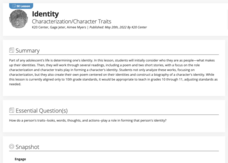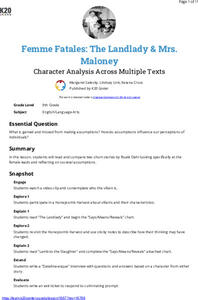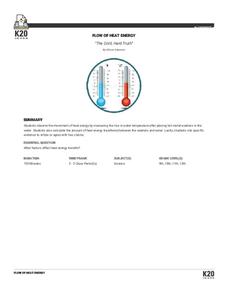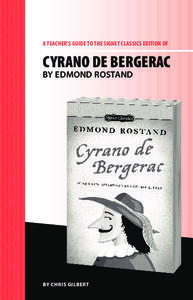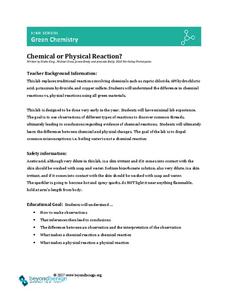K20 LEARN
Identity: Characterization/Character Traits
"Who am I?" Guy de Maupassant's short story "The Necklace," Julio Naboa Polanco's poem "Identity," and a clip from a Jason Bourne film provide learners with a context to consider the traits that makeup identity. Scholars create a...
K20 LEARN
The History of Spoken Word Poetry: Historical and Cultural Perspectives In Literature
Spoken word poetry, more than almost any other form, reveals the historical and cultural perspective of the poet. High schoolers listen to various spoken word poems, select one to research in-depth, and then apply what they have learned...
K20 LEARN
You Think You Have Problems: Perspective in Multi-Genre Literature
Young scholars are asked to reflect on how personal experiences might influence points of view and perspectives. They read poems and biographies of the poets and then match the poem to the poet. To justify their matches, learners...
K20 LEARN
Where I'm From: Poetry
We carry memories of where we're from; tweens and teens can capture these memories by first listening to several memory poems and then crafting their own. They analyze literary devices other poets use, brainstorm a list of images they...
K20 LEARN
Allotment in Indian Territory: Land Openings in Indian Territory
To understand how the allotment policy embedded in the Dawes Act, passed by the U.S. government in 1887, affected the tribal sovereignty of Native Americans, young historians examine various maps and documents and Supreme Court cases...
K20 LEARN
Considering "Charles": Pictograms, Annotations, Reading Strategies, And Multimodal Responses
Shirley Jackson's short story, "Charles," provides middle schoolers with an opportunity to practice their close reading skills. Using the provided list of prompts, scholars read and reread the story, then create a multimodal response to...
K20 LEARN
I Theme, You Theme, We All Theme For Ice Cream: Themes In Literature
Teach readers how to distinguish between a topic and a story's theme in a short lesson that uses the children's book, Should I Share My Ice Cream, as an exemplar. After listening to the story, pairs generate a list of topics covered in...
K20 LEARN
Femme Fatales - The Landlady and Mrs. Maloney: Character Analysis Across Multiple Texts
Two stories by Roald Dahl, "Lamb to the Slaughter" and "The Landlady" provide readers an opportunity to compare stories by the same author. After a close reading of the stories, teams select a character from one of the tales, craft...
K20 LEARN
Between The Lines: Inferences In The Narrative Life Of Frederick Douglass Excerpt
Good literature can be much like an iceberg requiring readers to presume that the bulk of the meaning may be inferred to be found below the surface. Here's a lesson that asks scholars to conduct a close reading of passages from The...
K20 LEARN
Here's How I Heard It: Using Folklore To Improve Close Reading Skills
"X" is for exaggeration, and "F" is for fact. To encourage close reading and to improve literary analysis skills, class members annotate fables and tall tales, like Paul Bunyan, with symbols that identify key features of this genre.
K20 LEARN
The Cold, Hard Truth
Things are really getting heated in the lab! Science scholars scope out the facts about heat energy transfer using a simple lab from the K20 Center. Groups collaborate to observe temperature changes between hot metal and water, then use...
K20 LEARN
More than Skin Deep
From crime to paternity, DNA fingerprinting has revolutionized how the world views inherited traits. Science sleuths investigate the facts about DNA profiling through a variety of activities. The Teacher's Guide includes printable...
K20 LEARN
Speedy Cat: Enzymes
Enzymes have a need for speed! What happens when they are forced to slow down? A well-rounded lesson plan from the K20 Center examines enzyme activity through role playing and a lab. Biology scholars work in teams and pairs to understand...
Facing History and Ourselves
Picture This
Sometimes what you get is far more than what you first see. The third routine in the Building Community series asks participants to engage in a See, Think, Wonder strategy. Small groups analyze a projected image, infer what is happening,...
Penguin Books
Teacher's Guide: When the Emperor Was Divine by Julie Otsuka
Julie Otsuka's haunting novel, When the Emperor Was Devine, is the subject of a 14-page teacher's guide. The guide includes the text of an interview with Otsuka, background information about Japanese immigration to the United States, and...
Penguin Books
A Teacher's Guide to the Signet Classics Edition of Cyrano de Bergerac by Edmond Rostand
Edmond Rostand's Cyrano de Bergerac has enjoyed popularity since its debut in 1897 due in large part to the themes it addresses. Instructors planning on using the play with their classes will find much to like in this teaching guide. The...
Overcoming Obstacles
Introducing Conflict Resolution
Conflicts come, and conflicts go, but it's how to resolve those conflicts that learners need to know. After identifying the states of conflict in a news article and engaging in a role-play activity, class members reflect on recurring...
Beyond Benign
Chemical or Physical Reaction?
Ready to take your chemistry class on its first big lab adventure? Dive in to differentiation between chemical and physical changes with a thoughtfully designed set of experiments! Partners conduct a series of reactions, describe their...
Trinity University
Introduction to Poetry
Introduce fourth graders to poetry with a three-week unit that has them examine the structural elements of poetry, analyze poems, and craft their own original poems rich in sensory details and other poetic devices. Young scholars study...
National Endowment for the Humanities
“Every Day We Get More Illegal” by Juan Felipe Herrera
A study of Jan Felipe Herrera's poem "Every Day We Get More Illegal" opens the door for a discussion on immigration. To begin, class members examine the photograph "Desert Survival," record their observations of the image, and then...
National Endowment for the Humanities
Societal Schisms and Divisions
The final lesson in the Crime and Punishment unit looks at the societal injustices depicted in Dostoyevsky's novel. Scholars examine the schisms between men and women, between wealth and poverty, between religion and skepticism, and...
K20 LEARN
Periodic Shuffle: Introduction to Periodicity and Electron Configuration
No matter how you shuffle the elements, their electron configurations keep them in the same order. How can that be? Introduce the concept of periodicity through a instructional activity that combines inquiry, discussion, and comparison....
National Endowment for the Humanities
Harriet Jacobs and Elizabeth Keckly: The Material and Emotional Realities of Childhood in Slavery
Young historians learn how to make generalizations based on primary sources in a instructional activity that uses the autobiographies of two women born into slavery. The class watches a historical re-enactment of scenes from the lives of...
National Endowment for the Humanities
Characterization in Lord of the Flies
Readers of Lord of the Flies hunt down direct and indirect examples of how William Golding brings his characters to life. After instructors guide learners through the process of collecting evidence of these two types of characterization...


